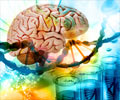
"Noonan syndrome affects one in 2,000 people, and up to half of these patients struggle with learning disabilities," explained principal investigator Alcino Silva, professor of neurobiology, psychiatry and psychology at the David Geffen School of Medicine at UCLA.
"Our approach identified the mechanism causing the disease, as well as a treatment that reversed its effects in adult mice. We are excited about these findings, because they suggest that the treatment we developed may help the millions of Noonan patients with intellectual disabilities."
While many genes contribute to Noonan syndrome, a single gene causes about half of all cases. This gene encodes for a protein that regulates another protein called Ras, which controls how brain cells talk to each other, enabling learning to take place.
Working with first author Young-Seok Lee, Silva discovered that the Noonan mutation creates hyperactive Ras, which disrupts cellular conversations and undermines the learning process.
"The act of learning creates physical changes in the brain, much like grooves on a record," said Silva, who is a member of the UCLA Brain Research Institute and UCLA Integrative Center for Learning and Memory.
Advertisement
Source-Eurekalert















